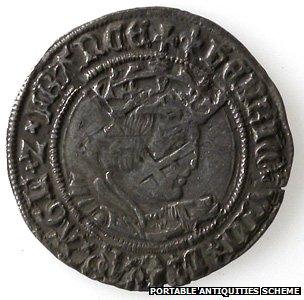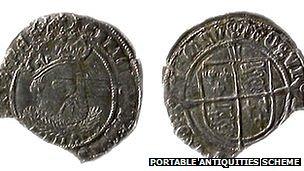Kett's Rebellion: 'Hidden' coin hoard declared treasure
- Published

The silver groats were found in a field in Wymondham in Norfolk
A hoard of coins minted during Henry VIII's reign and found by a metal detector enthusiast in a Norfolk field may have been buried to keep it safe during Kett's Rebellion in 1549.
The 14 silver groats, found in a field in Wymondham, were pronounced treasure by coroner William Armstrong in Norwich.
Kett's Rebellion during the reign of King Edward VI started in Wymondham.
The hoard was found in April 2011 by Steven Clarkson and Mark Turner.
Peasant protest
Objects which could qualify as treasure must be reported to the coroner under the 1996 Treasure Act , external.
Dr Adrian Marsden, of the British Museum, said in a report to the coroner it is "quite likely they (the coins) were hidden during the Kett uprising in July and August 1549".
He said the coins "probably represent a small proportion of the hoard originally concealed".
A valuation committee will decide on the value and compensation to be paid to the finder and landowner.

The coins may have been concealed during Kett's Rebellion
The rebellion started in Wymondham after a small group of peasants got together to protest against rich robber barons who had stolen the common land, leaving the peasants to starve.
Led by Robert Kett, the peasants marched 10 miles into Norwich and gathered on Mousehold Heath, attracting the support of the poorer people of Norwich.
Some 15,000 rebels eventually gathered and their battles against government forces on the streets of Norwich led to a national crisis.
They were finally defeated by an army of 13,000 men commanded by the Earl of Warwick.
Hundreds of peasants were killed and 300 were captured and executed in the city. Kett himself was imprisoned and later hanged from the battlements of Norwich Castle.